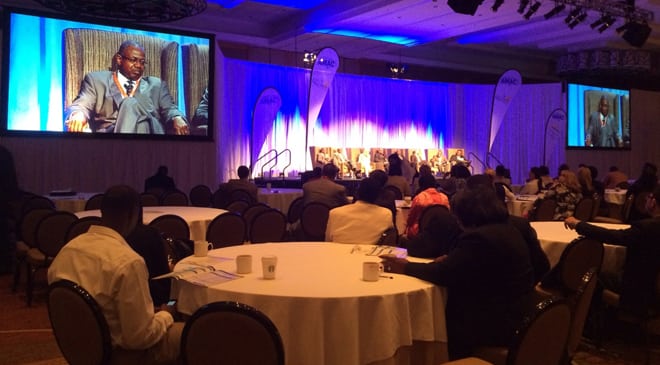The 2014 Airport Minority Advisory Council Business Diversity Conference spent equal time looking toward the future and remembering the past.
The organization, along with the Federal Aviation Administration and U.S. Department of Transportation, provided updates on issues facing members today but also celebrated and honored founders who established the first conference 30 years ago.
Honored on site at two of the conference luncheons were Leon Watkins, who was then the FAA’s director of civil rights; Clark Sharpe, then-civil rights officer for the FAA’s Southern Region; and Audrey Simmons, then-program specialist at the FAA’s Office of Civil Rights. The trio was greeted with a standing ovation Monday and spoke briefly about their roles in starting the conference.
Others involved in planning that first conference included Richard Judy, director of aviation at Miami International (MIA); Melvin McCray, director of maintenance at what is now Hartsfield-Jackson Atlanta International (ATL); Charles Rogers, deputy director of aviation at Philadelphia International (PHL); James Rogers, airport manager at Little Rock National (LIT); C.W. “Bill” Jennings, assistant executive director of airport operations at Orlando International (MCO) and Esterlene Lewis, chief of administrative services at MIA.
“Never in my dreams did I ever think we would have anything like this,” Watkins says.
Simmons and Lewis also were honored on Sunday at AMAC’s Women in Aviation breakfast event, where they were awarded the organization’s first Legacy Award.
Several speakers at the conference, held June 8 to 10 at the Sheraton Denver Downtown Hotel, celebrated the founders, spoke of the progress that has been made over three decades of conferences, and cautioned that there is more to be done to achieve true diversity and opportunity for women- and minority-owned businesses in the U.S.
Former Denver Mayor Wellington Webb, instrumental in ensuring minority participation in the construction of the current Denver International (DEN) and then in its ongoing operations, discussed during his Monday keynote speech the efforts he undertook in raising the percentage of women and minorities participating in DEN’s concessions, which at the time was below 10 percent.
“It was the right thing to do for our generation and the generations that follow,” he says.
Current Mayor Michael Hancock spoke at a luncheon Tuesday. He credited Webb and says he followed suit by making clear across all departments when he was elected that fair participation across city departments would be a key element of how city employees were evaluated.
The conference also included several large group and breakout educational sessions covering topics such as how to conduct disparity studies, how to prepare for growth opportunities and how to build a sustainable business. For the first time, AMAC had a session before the official start of the conference aimed at providing information for beginners who are just starting to consider pursuing airport opportunities.
FAA officials conducted two listening sessions during which they heard from attendees with advice on how the agency could tweak joint-venture guidance that was issued several years ago.
“We want to hear from you,” says Wilbur Barham, director of national airports civil rights policy and compliance for the FAA.
AMAC, FAA and USDOT officials also provided an update on several issues on which they are working.
One topic was a rental car white paper AMAC and the rental car industry worked together to craft aimed at increasing minority participation in that underrepresented industry. Mamie Mallory, assistant administrator for civil rights with the FAA, says the agency is reviewing the paper to assess the consequences of some of the recommended changes.
AMAC’s efforts to add participation goals to passenger facility charge-based capital programs at airports has also been an ongoing issue, both at the conference and on Capitol Hill. Mallory says Congress sent a letter recently to the agency asking it to further study the issue of reducing the use of Airport Improvement Program funding while increasing PFC-funded projects.
Mallory also adds that the agency has trained more than 600 certifiers since the 2012 FAA reauthorization bill instituted mandatory certification training.
“We hope the certification training will reduce errors, enhance reciprocity and improve the overall process,” she says.
The conference drew 850 participants, more than 10 times more than the first one in 1984. AMAC officials say the Women in Aviation breakfast and a fundraising golf tournament both sold out with record attendance and the exhibit hall was sold out, as well.
A silent auction aimed at raising funds for scholarships brought in $16,000. The annual AMAC After Dark Scholarship Fundraising Reception raised another $4,000. The 2014 conference closed with Hancock’s keynote speech and an awards luncheon.
AMAC award winners for 2014 were:
• Award of the Organization – Dallas/Fort Worth International (DFW) and Denver DEN (tie)
• Airport AEC (Architectural, Engineering, Construction) Award – PHL
• Airport Concessions Award – ATL
• Business Partner of the Year – Robert Crews, president and CEO of Crews Enterprises
• Advocate of the Year – Barbara Oliver, publisher of Minority Business Entrepreneur magazine
• President’s Award – John D. Clark III, president and CEO of JClark Consulting Group LLC
• Chair Award for Outstanding Performance – Memphis International (MEM)
• Hall of Fame – Robert Ashby, USDOT official who was lead author of the original Disadvantaged Business Enterprise program; Joseph Austin, also of USDOT; and Oliver
The 2015 AMAC Airport Business Diversity Conference will be hosted by Fort Lauderdale-Hollywood International (FLL).






